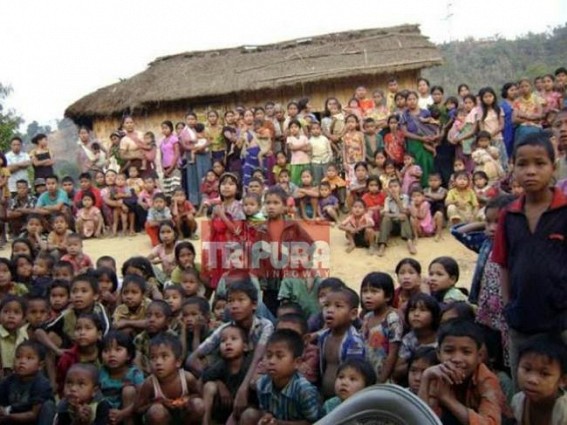TIWN

KANCHANPUR (North Tripura), March 4 (TIWN) : Bru refugees are treated below sub-citizens in their own country since three decades due to apathy of their own State Mizoram. Around 31,300 Reang tribals, who locally call themselves "Bru", have been living in seven makeshift camps in northern Tripura since October 1997 after they fled neighbouring Mizoram following ethnic troubles after the killing of a Mizo forest officer. As directed by the Supreme Court, the home ministry held several meetings in New Delhi with the officials of Mizoram and Tripura and leaders of the Mizoram Bru Displaced People's Forum (MBDPF), the lone organisation of the refugees, to resolve the imbroglio. A team led by TIWN photographer and correspondents had visited at the Gachiram Para camp in Kanchanpur subdivision under North Tripura district, the biggest of the camps, housing 18,000 refugees at there. Refugees have no school to go and the children being the offspring of uneducated parents and hapless governments, have no future and no life at all.Political clashes and disputes between Mizoram & Tripura have left so many children’s future in bleak who are sidelined with the title of “Refugeesâ€.
There are however total eight camps in North Tripura.
After the visit of TIWN team, atleast it is clear that Reangs, who fled Mizoram in the wake of inter-community violence and are now housed in refugee camps in Tripura, are burdened with a full uncertain future.
Chief Minister visited the camps himself during the emergency times of 2011 when fire broke out at Gachiram Para, and also sent the then Health Minister to the camp to supervise the functioning of the special medical teams, but after that till day the situation has yet not been progressed.
The water they drink are toxic, the sheds where they live are unhygenic and they have no chance to be educated and in this way thousands of children’s future are wasting being a part of Tripura’s refugee.
If the political discussion and no solution is the excuse of Tripura govt. behind their refugee lives as well as Mizo govt. then what’s the meaning of keeping political leaders in states?
Although Tripura Government claims for spending Rs.2 crores on relief work, but the situation at there are unchanged. The refugee children at Gachiram Para are learning a life almost from barbaric society, where no education, no healthy environment is provided to the children for the sake of their future.
Union Home Minister Rajnath Singh, accompanied by his deputy, Kiren Rijiju, and senior officials had visited refugees camps earlier this year to persuade the refugees to return to their homes.
Rajnath Singh also met Tripura Chief Minister Manik Sarkar and discussed the issue. Mizoram Chief Minister Lal Thanhawla was supposed to attend the meeting in Agartala but he did not turn up, citing urgent work in the state.
MBDPF general secretary Bruno Msha said the Mizoram government was yet to accept their eight-point demands in writing. These include Rs.200,000 for each tribal family as financial support, free rations for four years, contiguous resettlement of the returnees and adequate security.
- 'Intolerable.....' Corporators Lodged FIR against Madhabi Biswas over 'Insane Video' on social media targeting PM & Mayor
- Blood Donation Camp Organized in Sipahijala District
- Yuvrajnagar Panchayat Samiti Chairperson's Husband Denies Molestation Allegations
- CPIM Submits Memorandum for Fair Voter List Revision
- 23 Panchayats in Gauranagar Block Receive Computers, Printers, and LED TVs



